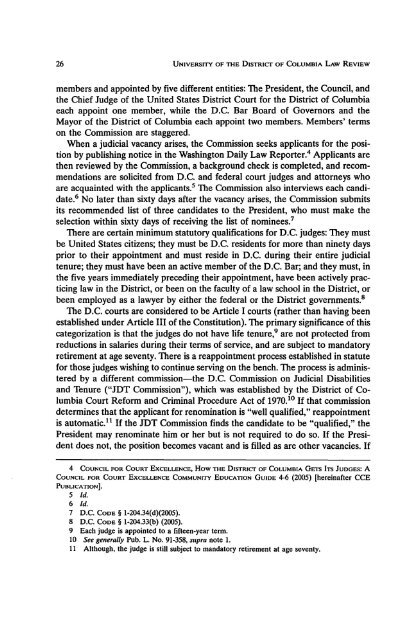Download Electronic Version - UDC Law Review
Download Electronic Version - UDC Law Review
Download Electronic Version - UDC Law Review
Create successful ePaper yourself
Turn your PDF publications into a flip-book with our unique Google optimized e-Paper software.
26 UNIVERSITY OF THE DISTRICf OF COLUMBIA LAW REVIEW<br />
members and appointed by five different entities: The President, the Council, and<br />
the Chief Judge of the United States District Court for the District of Columbia<br />
each appoint one member, while the D.C. Bar Board of Governors and the<br />
Mayor of the District of Columbia each appoint two members. Members' terms<br />
on the Commission are staggered.<br />
When a judicial vacancy arises, the Commission seeks applicants for the position<br />
by publishing notice in the Washington Daily <strong>Law</strong> Reporter. 4 Applicants are<br />
then reviewed by the Commission, a background check is completed, and recommendations<br />
are solicited from D.C. and federal court judges and attorneys who<br />
are acquainted with the applicants. s The Commission also interviews each candidate.<br />
6 No later than sixty days after the vacancy arises, the Commission submits<br />
its recommended list of three candidates to the President, who must make the<br />
selection within sixty days of receiving the list of nominees?<br />
There are certain minimum statutory qualifications for D.C. judges: They must<br />
be United States citizens; they must be D.C. residents for more than ninety days<br />
prior to their appointment and must reside in D.C. during their entire judicial<br />
tenure; they must have been an active member of the D.C. Bar; and they must, in<br />
the five years immediately preceding their appointment, have been actively practicing<br />
law in the District, or been on the faculty of a law school in the District, or<br />
been employed as a lawyer by either the federal or the District governments. s<br />
The D.C. courts are considered to be Article I courts (rather than having been<br />
established under Article III of the Constitution). The primary significance of this<br />
categorization is that the judges do not have life tenure,9 are not protected from<br />
reductions in salaries during their terms of service, and are subject to mandatory<br />
retirement at age seventy. There is a reappointment process established in statute<br />
for those judges wishing to continue serving on the bench. The process is administered<br />
by a different commission-the D.C. Commission on Judicial Disabilities<br />
and Tenure ("JDT Commission"), which was established by the District of Columbia<br />
Court Reform and Criminal Procedure Act of 1970. 10 If that commission<br />
determines that the applicant for renomination is "well qualified," reappointment<br />
is automatic. ll If the JDT Commission finds the candidate to be "qualified," the<br />
President may renominate him or her but is not required to do so. If the President<br />
does not, the position becomes vacant and is filled as are other vacancies. If<br />
4 COUNCIL FOR COURT EXCELLENCE, How THE DISTRICT OF COLUMBIA GETS ITS JUDGES: A<br />
COUNCIL FOR COURT EXCELLENCE COMMUNITY EDUCATION GUIDE 4-6 (2005) [hereinafter CCE<br />
PUBLICATION].<br />
5 [d.<br />
6 [d.<br />
7 D.C. CODE § 1-204.34(d)(2005).<br />
8 D.C. CODE § 1-204.33(b) (2005).<br />
9 Each judge is appointed to a fifteen-year term.<br />
10 See generally Pub. L. No. 91-358, supra note 1.<br />
11 Although, the judge is still subject to mandatory retirement at age seventy.














